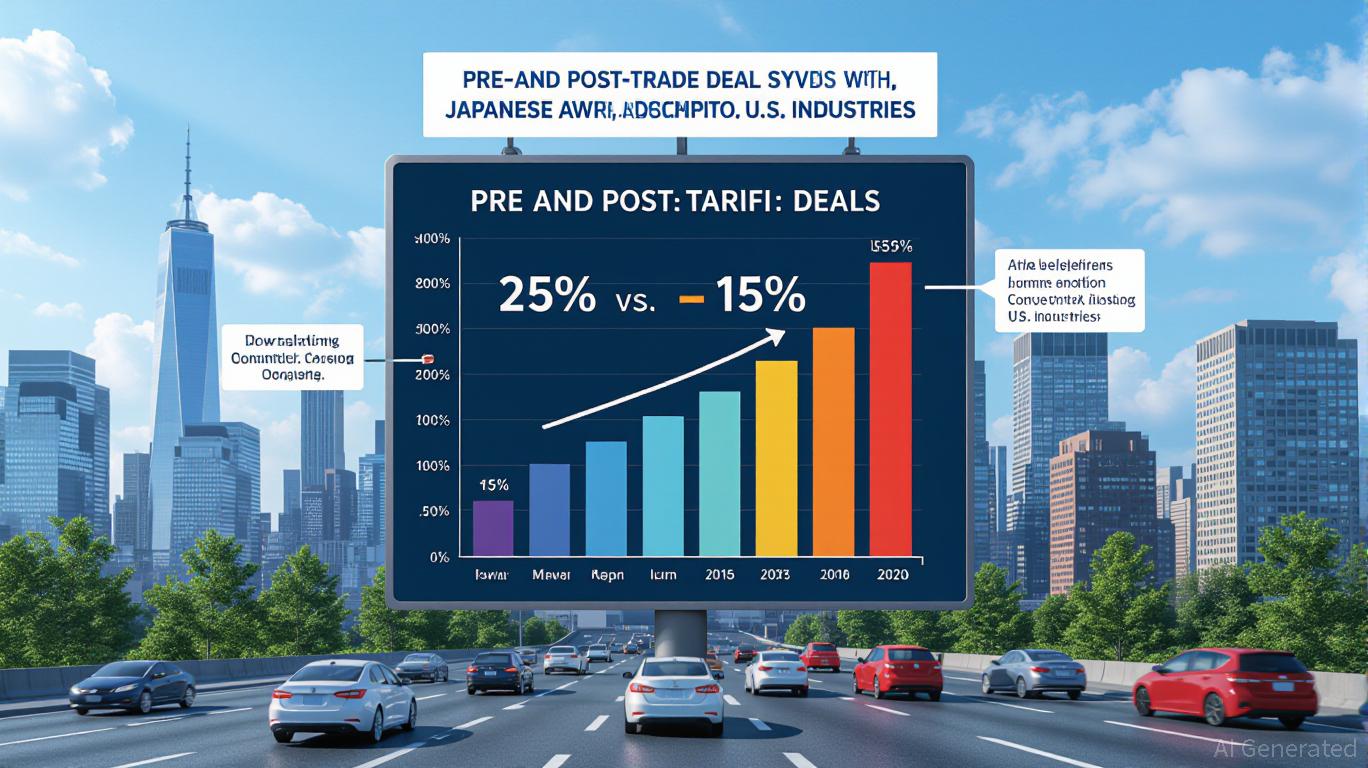
The U.S.-Japan trade deal finalized in July 2025 has emerged as a seismic shift in global trade dynamics, offering a rare confluence of tariff relief and cross-border investment that positions Japanese export-linked sectors for outperformance. For equity investors, the agreement’s terms—particularly the reduction of U.S. import tariffs on Japanese automotive exports from 25% to 15%—signal a strategic recalibration of competitive advantages in favor of Japanese manufacturers. This development, coupled with a $550 billion investment pledge from Japan into U.S. infrastructure and industrial sectors, creates a compelling case for repositioning portfolios toward key beneficiaries of this bilateral reset.
Automotive Sector: A Tailwind for Japanese Exporters
The most immediate and tangible impact of the trade deal is on the automotive industry. Japanese automakers, long constrained by U.S. tariff threats, now face a significantly lighter burden. According to a report by the American Investment News, the 15% tariff rate eases margin pressures for companies like Toyota, Honda, and Nissan, which collectively account for over 40% of U.S. light vehicle imports [1]. For Toyota, which has already expanded its U.S. production capacity, the reduced rate could translate into a 28% improvement in operating profits, assuming current demand trends hold [3].
Equity analysts at Goldman Sachs have upgraded Subaru’s stock to a “Buy” recommendation, citing its proactive strategy to mitigate tariff impacts through price hikes and supply chain optimization [2]. Similarly, Honda, which lacks the profit margins of Toyota or Subaru, is positioned as a high-conviction play, with its stock trading above key moving averages and a projected 12% earnings boost from the deal [2].
However, the benefits extend beyond automakers. The $550 billion investment pledge into U.S. sectors like semiconductors and energy infrastructure indirectly supports the automotive supply chain. Japanese firms such as Tokyo Electron and Advantest, which supply critical semiconductor equipment to U.S. manufacturers, stand to gain from increased demand driven by this investment [2].
Agricultural and Energy Sectors: U.S. Gains, Japanese Opportunities
While the focus has been on Japanese exporters, the trade deal also unlocks significant opportunities for U.S. agribusinesses. Japan’s commitment to increase U.S. rice imports by 75% and purchase $8 billion in agricultural goods—including corn, soybeans, and bioethanol—creates a tailwind for firms like Riceland Foods and Farmers’ Rice Cooperative [5]. These companies, already holding a 14.2% share of U.S. rice exports to Japan, are poised to benefit from expanded quotas and stabilized pricing [6].
For Japanese investors, the deal’s energy provisions are equally promising. Japan’s purchase of sustainable aviation fuel and bioethanol aligns with U.S. energy transition goals, offering long-term growth prospects for companies like Growth Energy [7]. This cross-border alignment of interests underscores the deal’s potential to create a virtuous cycle of investment and demand.
Risks and Strategic Considerations
Despite the optimism, investors must remain vigilant. The 50% tariffs on Japanese steel and aluminum imports remain in place, creating a cost disadvantage for U.S. automakers like General Motors and Ford, which have already reported a combined $1.5 billion in profit losses [4]. Additionally, the structure of Japan’s $550 billion investment—framed as loans and guarantees rather than direct equity stakes—introduces uncertainty about its long-term impact on U.S. industrial capacity [2].
Equity analysts recommend a hedged approach. For Japanese exporters, diversifying supply chains and investing in R&D to offset potential currency risks is critical [2]. On the U.S. side, investors should prioritize companies with strong cross-border ties, such as Riceland Foods and Growth Energy, while monitoring geopolitical tensions that could disrupt trade flows [8].
Strategic Positioning for Investors
The Japan-U.S. trade deal represents a strategic inflection point for equity markets. For Japanese automakers, the reduced tariffs and investment inflows into U.S. infrastructure create a dual tailwind that justifies overweight allocations. Investors should consider adding exposure to Toyota, Honda, and Subaru, while also hedging against yen volatility through inverse ETFs [2].
On the U.S. side, agribusinesses with direct ties to Japan—such as Riceland Foods and Sun Valley Rice—offer attractive entry points, given the expanded market access and quota increases. Energy transition plays, particularly in bioethanol and sustainable aviation fuel, also warrant attention as Japan’s purchases align with global decarbonization trends [7].
In conclusion, the trade deal is not merely a tariff adjustment but a recalibration of economic interdependence. For investors, the key lies in identifying companies best positioned to capitalize on this new equilibrium while mitigating sector-specific risks.
**Source:[1] Japan-U.S. Trade Deal Progress: Implications for Automotive and Agricultural Sectors [https://www.ainvest.com/news/japan-trade-deal-progress-implications-automotive-agricultural-sectors-2509/][2] The U.S.-Japan Trade Deal: A Catalyst for Global Tariff Stability and Strategic Equity Opportunities [https://www.ainvest.com/news/japan-trade-deal-catalyst-global-tariff-stability-strategic-equity-opportunities-2507/][3] Toyota Leads Japan Stocks Higher on U.S. Tariff Deal [https://global.morningstar.com/en-nd/stocks/toyota-leads-japan-stocks-higher-us-tariff-deal][4] Trump’s ‘Massive’ Deal with Japan is Giving U.S. Automakers Heartburn [https://www.politico.com/news/2025/07/23/trumps-massive-deal-with-japan-is-giving-u-s-automakers-heartburn-00473313][5] U.S. Ag Groups Praise Trade Deal with Japan [https://www.world-grain.com/articles/21667-us-ag-groups-praise-trade-deal-with-japan][6] Exploring U.S. Rice Exports by Country in 2024-25 [https://www.usimportdata.com/blogs/us-rice-exports-by-country-2024-25][7] Growth Energy Cheers Trade Deals with Indonesia & Japan [https://growthenergy.org/2025/07/23/us-trade-deals-indonesia-japan][8] U.S.-Japan Trade Pact Recalibrates Tariffs, Investment, and Global Supply Chains [https://thefulcrum.us/business-democracy/japan-us-trade-deal]


AloJapan.com